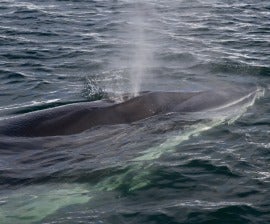-

Pilipenko/istock
SAN JOSÉ, Costa Rica—A recent workshop to develop strategies to protect dolphins and whales in and around Costa Rica resulted in agreements to pursue efforts to increase protections for these animals at this month’s meeting of the International Whaling Commission in Brazil.
Humane Society International/Latin America met with the Vice Ministry of Water and Oceans, other government agencies, marine mammal experts, non-governmental organizations, and the academic sector on August 10 at a workshop on the conservation of these majestic animals.
Take action now to help whales.
Participants discussed the status of scientific research, threats to cetacean populations, and policies, education and funding to assist government agencies in decision making about cetacean protection in Costa Rica.
“We seek to maintain Costa Rica´s leadership on these issues, drawing the line in the conservation of whales and dolphins and their important role in marine ecosystems, and highlighting the guidelines for how activities such as whale and dolphin watching can be conducted responsibly,” said Grettel Delgadillo, deputy director of HSI/Latin America.
The Vice Ministry of Water and Oceans and the National System of Conservation Areas (SINAC) of the Ministry of Environment work to establish public policies for the conservation of cetaceans. They also coordinate with the tourism industry in coastal areas on activities such as the Whales and Dolphins Festival, which takes place every year in September when high sighting season coincides with migration season at Marino Ballena National Park, one of Costa Rica´s most visited beaches.
“The health of our oceans is a priority, that’s why we are committed to the conservation of species that are fundamental to the marine ecosystems, such as whales. It is key to create a link between the government and the scientific experts in this issue in order to promote actions and public policies that allow us to achieve this goal,” said Haydée Rodríguez Romero, Vice Minister of Water and Oceans.
Commercial hunting, climate change, and ocean pollution threaten the future survival of whales, dolphins, and porpoises.
If you wish to support the work of HSI/Latin America in favor of animals, visit our Facebook profile facebook.com/HSILatinAmerica or search for HSI on the Yo me Uno platform of BAC Credomatic.
Media Contact: Grettel Delgadillo, deputy director of HSI/Latin America, (506) 7018-4437, gdelgadillo@hsi.org
